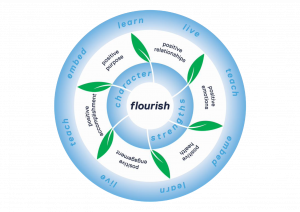Flourishing as a by-product.
Our model is central to the concept of ‘flourishing.’ This is not like a goal that we are actively striving to achieve every day, but is viewed more as a by-product, or a healthy consequence of living a life in such a way that nurtures one’s individual wellbeing and contributes to the wellbeing of others.

Flourishing refers to the experience of life going well – when we are feeling good and functioning effectively (Huppert & So, 2012; Seligman, 2011).
Positive Education is based on the premise that what we do matters – that experiencing positive mental health and wellbeing in adolescence, along with learning skills and knowledge that help maintain this positive mental health and address mental health difficulties, will contribute to becoming a fully engaged young adult in society. This was supported empirically through an analysis of 1000 participants in the Australian Temperament Project (O’Connor et. al, 2016), one of Australia’s most representative and longest running studies of social and emotional development. O’Connor found that positive mental health in adolescence was associated with indicators of career progression and taking on citizenship responsibilities (volunteering and civic activities) over a decade later. In this way, Positive Education is all about ‘learning to flourish’.
